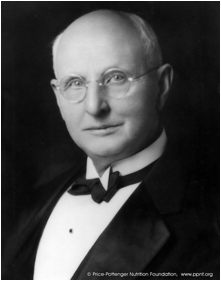A Restaurant Rating Guide based on the dietary principles of the Weston A. Price Foundation
Based on the dietary principles of
the Weston A. Price Foundation
About The Weston A. Price Foundation
The Weston A. Price Foundation is a nonprofit, tax-exempt charity founded in 1999 to disseminate the research of nutrition pioneer Dr. Weston Price, whose studies of isolated nonindustrialized peoples established the parameters of human health and determined the optimum characteristics of human diets. Dr. Price’s research demonstrated that humans achieve perfect physical form and perfect health generation after generation only when they consume nutrient-dense whole foods and the vital fat-soluble activators found exclusively in animal fats.
The Foundation is dedicated to restoring nutrient-dense foods to the human diet through education, research and activism. It supports a number of movements that contribute to this objective including accurate nutrition instruction, organic and biodynamic farming, pasture-feeding of livestock, community-supported farms, honest and informative labeling, prepared parenting and nurturing therapies. Specific goals include establishment of universal access to clean, certified raw milk and a ban on the use of soy formula for infants. Read more about the WAPF on our main website.

DR. WESTON A. PRICE
Dr.Weston A. Price (1870-1948), a Cleveland dentist, has been called the “Isaac Newton of Nutrition.” In his search for the causes of dental decay and physical degeneration that he observed in his dental practice, he turned from test tubes and microscopes to unstudied evidence among human beings. Dr. Price sought the factors responsible for fine teeth among the people who had them- the isolated “primitives.”
The world became his laboratory. As he traveled, his findings led him to the belief that dental caries and deformed dental arches resulting in crowded, crooked teeth and unattractive appearance were merely a sign of physical degeneration, resulting from what he had suspected-nutritional deficiencies.
Price traveled the world over in order to study isolated human groups, including sequestered villages in Switzerland, Gaelic communities in the Outer Hebrides, Eskimos and Indians of North America, Melanesian and Polynesian South Sea Islanders, African tribes, Australian Aborigines, New Zealand Maori and the Indians of South America. Wherever he went, Dr. Price found that beautiful straight teeth, freedom from decay, stalwart bodies, resistance to disease and fine characters were typical of primitives on their traditional diets, rich in essential food factors.
When Dr. Price analyzed the foods used by isolated primitive peoples he found that they provided at least four times the calcium and other minerals, and at least TEN times the fat-soluble vitamins from animal foods such as butter, fish eggs, shellfish and organ meats. Read more about Dr. Price on the main WAPF website.
How We Rate Restaurants
This site is meant to help people find at least acceptable food when they are in an area without many options. And it’s also meant to highlight those establishments that are really doing great things. An establishment can earn one “spoon” for each of our 12 criteria they meet. A 1-Spoon establishment signals a place where that busy traveler will find at least a few acceptable dishes, whereas a 12-Spoon establishment signals a place that truly gets it; that’s doing everything right. We hope that as the site gains traction and food purveyors learn of it, they’ll want to know our criteria and how they can earn a higher score. We look forward to a day when there will be a number of high-scoring establishments in every locale, at a variety of price points.
Our 12 Criteria
- From Scratch: Serves mostly (i.e., more than half of the menu) fresh food, prepared from scratch. Does NOT rely primarily on kits or prepared/partially prepared foods from commercial food services. More…
- Local/Organic: Offers at least some locally sourced and/or organically produced food and/or wild-caught seafood. More…
- Pastured: Offers at least some pastured animal foods.
- Organs: Offers some dishes made with organ meats (liver/paté, sweetbreads, heart, kidney, brains, etc.).
- Cooking Fats: Cooks (sautés) in natural fats such as butter, lard, tallow, duck fat, coconut oil, or olive oil; uses lard, duck fat, or tallow for frying.
- Bone Broth: Makes own bone broths/stocks for use in soups, stews, gravies, and sauces (does NOT use canned broth or powdered soup bases).
- Seasonings: Makes own seasoning mixes (does NOT use flavoring packets or MSG)
- Salad Oils: Makes own salad dressings using olive oil or cold-pressed sesame oil.
- Breads: Offers genuine sourdough bread.
- Beverages: Offers lacto-fermented beverages (such as kombucha or kvass).
- Condiments: Offers lacto-fermented condiments.
- Desserts: Offers desserts made in house with natural sweeteners (such as raw honey, maple syrup, maple sugar, molasses, date sugar, palm sugar, coconut sugar, sorghum syrup, or malt syrup).